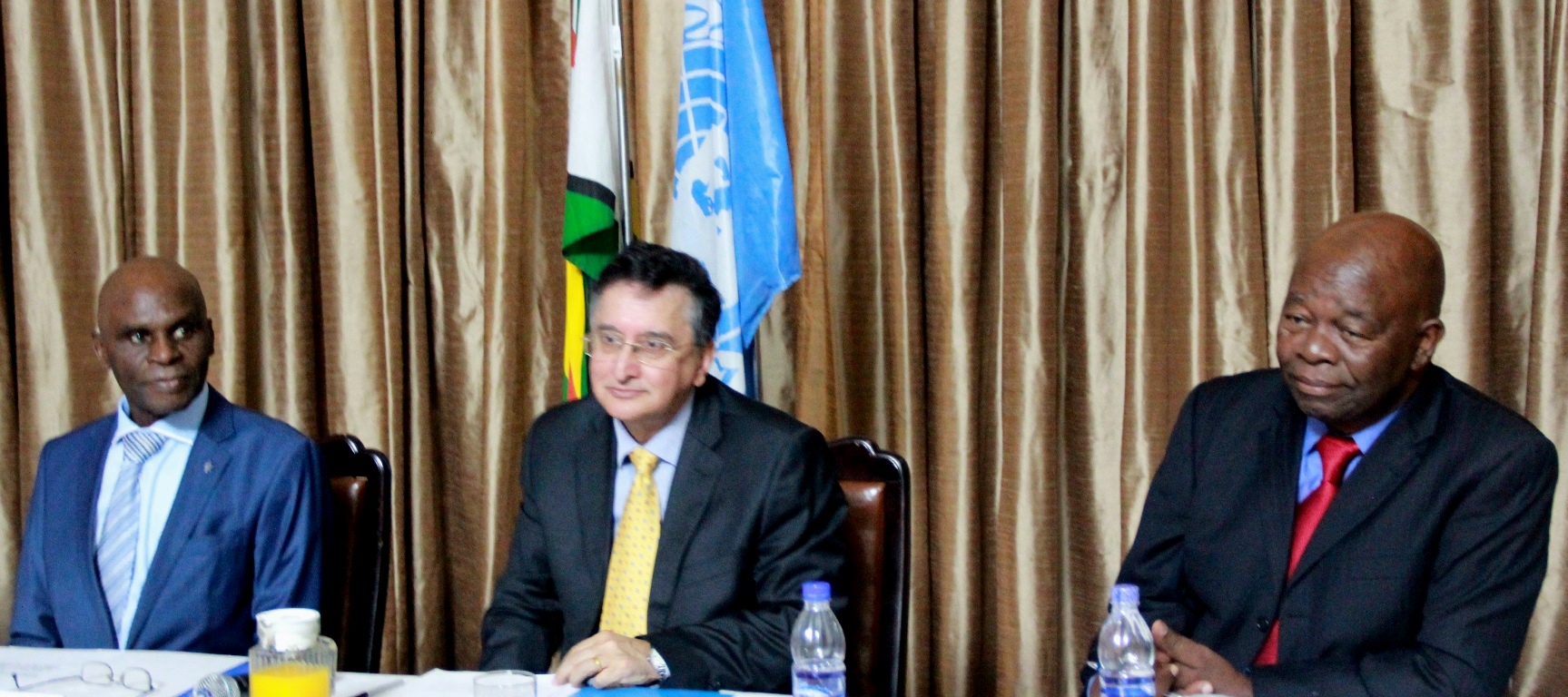The Zimbabwe Development Cooperation Forum is a platform that is set to expedite the implementation of the Sustainable Development Goals (SDGs) in line with the Agenda 2030.
On 10 October 2017, the Office of the President and Cabinet, and the United Nations Resident Coordinator convened the first multi-stakeholders meeting of the Zimbabwe Development Cooperation Forum that brings together some 150 senior officials from the Government, UN Ambassadors and Diplomats accredited to Zimbabwe, Non-Governmental and Civil Society Organisations.
Thanking the United Nations and development partners for their proactive participation, Deputy Chief Secretary to the President and Cabinet, Mr. Justin Mupamhanga said, “the Forum will serve as a platform for multidisciplinary policy dialogue to advance Zimbabwe’s progress towards the 2030 Agenda for Sustainable Development and foster development cooperation under guiding principles of national ownership of development programmes, focus on results, inclusiveness and transparency and accountability.”
In this regard, the Deputy Chief Secretary, Mr. Mupamhanga said that coordination of development cooperation at the strategic and policy levels based on common vision and understanding for Zimbabwe’s future is critical.
According to the latest available OECD data Zimbabwe receives substantial amount of Official Development Assistance to the tune of USD 815 million to complement development efforts.
Commending development partners for their continued commitment, Mr. Bishow Parajuli, the UN Resident Coordinator to Zimbabwe said, “through the 2016-2020 Zimbabwe UN Development Assistance Framework (ZUNDAF), the United Nations delivered over USD 600 million of development assistance over the 18-month period (Jan 2016 to mid-2017).”
“Under the Humanitarian Response Plan (April 2016 to March 2017), with the generous support and solidarity from the development partners, the UN and NGOs delivered over USD 218 million of humanitarian assistance to the most vulnerable and food insecure people negatively affected by the El Nino-induced drought. It is, therefore, critical to ensure this generous support continue and we show high impact”, added Mr. Parajuli.
Going forward, the United Nation reiterated its commitment to support the strengthening of national institutions and systems, and optimize the value of contributions by development partners to national capacity development through enhanced common results management and reporting framework as well as coordinated support to the overall development including resilience building, disaster risk reduction, preparedness and response.
Representing one of the development partners in Zimbabwe, Ms. Annabel Gerry, Head of UK’s Department for International Development (DFID) said, “There may be challenges ahead for Zimbabwe but it is important to have opportunity to discuss transparently and regularly, if we are to make progress on the Sustainable Development Goals.”
Noting the need for joint efforts to target the most vulnerable populations and address the root causes of multi-dimensional vulnerabilities, the UN Resident Coordinator said, “Investments and efforts must have a lasting impact on eradicating poverty and reducing inequality, on sustainable development, on promoting inclusive growth, and on enhancing national capacities, aligned with the national priorities and policies.”
Building on the successful participation of Zimbabwe in the Voluntary National Review of its progress on SDGs at the UN High-Level Political Forum in New York in July this year, the Forum reiterated for a continued monitoring of the SDGs implementation and expanded engagement of all stakeholders including youth and people with disabilities.
Noting peace, human rights, and sustainable development as indivisible, the UN Resident Coordinator commended the Government for its participation in the Universal Periodic Review (UPR) Second Cycle in November 2016, where 151 recommendations were accepted.
The UN Resident Coordinator said that the United Nations stands ready to support to Zimbabwe on ratifying the remaining three core international human rights treaties: The Convention Against Torture and other Cruel, Inhuman or Degrading Treatment or Punishment; the International Convention on the Protection of the Rights of All Migrant Workers and Members of Their Families; and, the International Convention for the Protection of all Persons from Enforced Disappearance.
Representatives of Ministry of Finance and Economic Development; Ministry of Macro Economic Planning and Investment Promotion; Ministry of Justice, Legal and Parliamentary Affairs provided update on fiscal issues and measures; implementation of SDGs, and the UPR recommendation, respectively. In addition, representative of the CSOs Reference Group on SDGs gave perspectives on civil society engagement in the implementation of SDGs in Zimbabwe.






